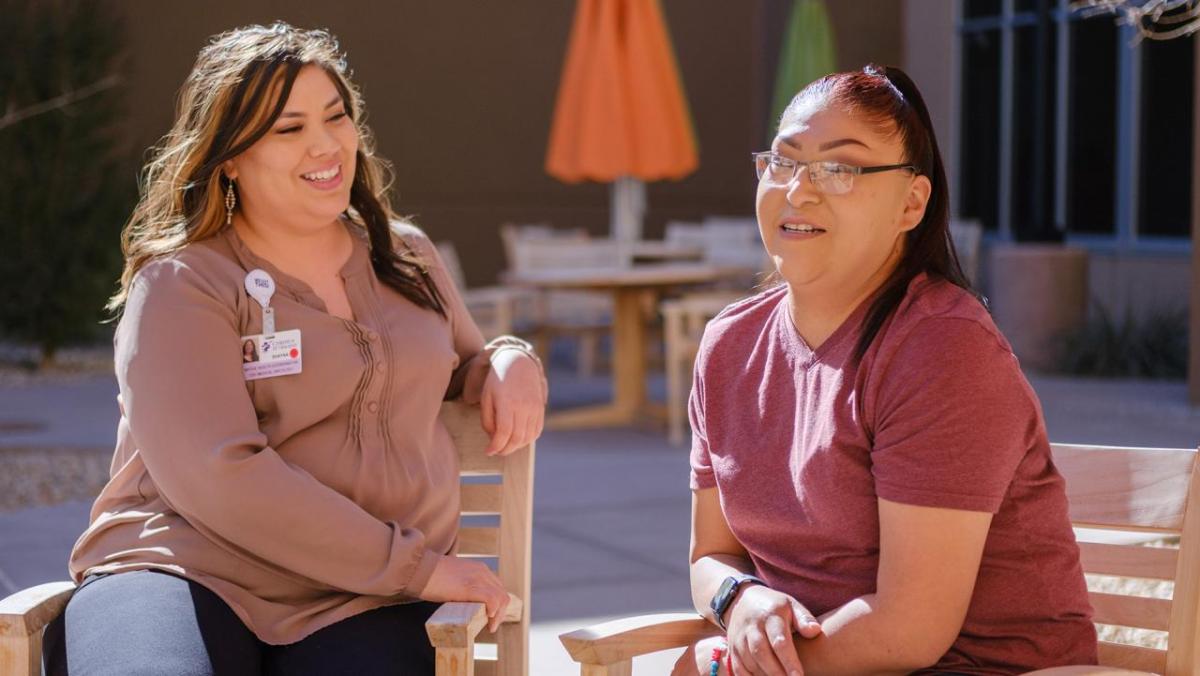Gilead Sciences: Native Health Navigator Program Connects Tribes to Cancer Care

Olivia Sloan was pursuing a career in health policy and research when her father was diagnosed with non-Hodgkin lymphoma. The devastating news put her work on hold as she returned home to Santa Fe, New Mexico to help care for her dad.
Four years later her mother was diagnosed with breast cancer. Olivia, whose mother is Navajo and Tohono O'odham, spent most of this time helping her parents navigate their treatment at the CHRISTUS St. Vincent Regional Cancer Center. She’s grateful that her educational and career background helped her advocate on behalf of her family, but she knows not everyone is able to do this.
It’s fitting that today Olivia is a registered nurse at the cancer center and leads the Native Health Navigator (NHN) program that launched last July with the help of Gilead’s Toward Health Equity Oncology Grant. Through the grant, Gilead partners with organizations that share in its goal of transforming cancer treatment by expanding access and addressing barriers to care.
Depending on a patient's tribal affiliation and residence, diagnostic work and treatment often requires a referral to an unfamiliar system – something that can be both confusing and intimidating for patients. That’s where the NHN program is helping by connecting breast cancer patients referred from Indian Health Services (IHS) and tribal or urban clinics to care at CHRISTUS St. Vincent Regional Cancer Center.
“Traversing outside the Native American healthcare system can be daunting,” says Olivia. “The cultural needs that our patients face really stand out, therefore we knew we had to do more to serve Native American patients in a genuine, authentic and culturally sensitive way.”
Shayna Grandbois-Herrera of the Turtle Mountain Chippewa tribe was hired as the program’s first navigator. She provides support every step of the way, from addressing appointment transportation needs and childcare to untangling complicated insurance payment processes. She even connects patients to groceries and nutritious meals.
The emotional and physical stress of those facing breast cancer adds to the care challenges. Having to see new doctors can compound the fear that comes from a cancer diagnosis, but the NHN program provides patients a human bridge to help navigate screenings, diagnostics and treatment.
For Amy, a Native American mother of two, having a navigator has made all the difference. She was diagnosed with stage IV breast cancer in January but was juggling so much in her life that she didn’t plan to start treatment. However, being introduced to Shayna through the NHN program changed that. Today Amy attends her multiple medical appointments each week with Shayna there to communicate with providers as needed.
“No one should feel alone when they have a diagnosis,” says Shayna. “Every patient deserves a warm embrace.”
Olivia and Shayna both hope the program will ultimately help reduce these late-stage breast cancer diagnoses in their community. “We know mortality rates are much higher for Native American patients with cancer,” Olivia says. “The program is helping to remove the fear and other barriers so we can bring patients into care earlier.”
Just a few months into this program, the organization is already seeing a difference in patients’ willingness and ability to receive breast cancer care. They often start out wary of the unfamiliar health care system, but through the NHN program they gain a guide from their cultural background who understands their experience and can help change their health outcomes.
“To care for and work with Native American patients, honor individual tribes and their sovereignty, and work with them as true partners in advancing healthcare is a really beautiful vision and goal for our state and our communities,” concludes Olivia.

